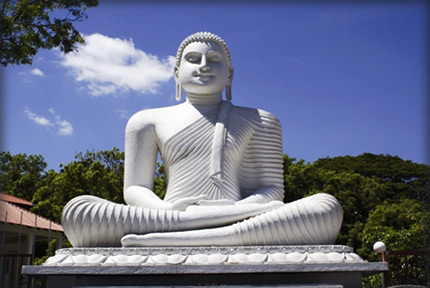|
Il Full moon Poya Day falls on Thursday:
Want a ‘good’ friend? First, be one yourself
By Lionel Wijesiri
With a computer, tablet or smartphone today we can share photos,
thoughts and the experiences of the moment with family and friends
anywhere in the world at any time. With a quick search, it is possible
to find and reconnect with our old friends and even befriend people
we’ve never met face-to-face.
|

The Buddha statue in Polonnaruwa |
The numbers of social network ‘friends’ can grow to the point where
one individual quipped that he has more friends on Facebook than he does
in real life!
More and more modern research is showing the adverse impact social
media and ‘digital friends’ can have on our ability to relate to others
in person. But even apart from these modern challenges, how to make
friends has been a perennial question of vital interest to people
through the ages.
Everyone wants to have ‘good’ friends who are loyal and true, but not
everyone knows how to have or be such a friend. According to modern
social scientists, there are few qualities that need to be internalised
in your own life to gain a good friend and become one, too.
1. Take a genuine interest in others.
Dale Carnegie, author of How to Win Friends and Influence People,
said, “You can make more friends in two months by becoming interested in
other people than you can in two years by trying to get people
interested in you.”
Every person has an invisible sign around his or her neck that reads,
“I want to feel important.”
Everyone has something to offer this world. We need to search for it,
find it, and bring it to the surface.
2. Be a giver, not a taker
Ask not what your friends can give to you but rather what you can
give to your friends. What can we give to others? How about a smile, a
hug, a kind word, a listening ear, help with an errand, an encouraging
note, a meal?
We can come up with many things to give others if we are willing to
be attentive to their needs. Giving may take time. It may take us out of
our way. But giving and self-sacrifice are part of the definition of
love.
3. Be loyal.
Loyalty is a rare commodity in today’s world, but it’s an absolute
requirement in true and abiding friendships. When we are loyal to one
friend, we prove ourselves worthy of many. One way we show our loyalty
is through our words - or lack thereof.
In fact, a key to being loyal is keeping a tight rein on our spoken
words. It’s easy to gossip or pass judgment; it’s much harder to keep
silent. Jealousy, envy, and a range of other negative emotions can keep
us from being loyal.
4. Be a positive person.
We all want friends we can enjoy! People who consistently bring us
down with their problems and complaints are generally not the ones we
want to pal around with for any length of time.
We want our friendships to be positive and uplifting - and that means
we must be positive, uplifting friends ourselves.
5. Build on common interests.
What is it that brings friends together in the first place? There is
usually something that draws us to others - a common hobby, a sport, a
volunteer project, a children’s activity.
In our busy society, it can be difficult to create times to get
together with people. But if we take advantage of the common activities
and interests we have with others, we can fit the time for friendship
into our schedules.
If you and a friend both like to exercise, work out together. If you
both like to read, go to the bookstore together to pick out your next
selection, grab some coffee, and talk about the last book you read.
Buddhist concept
|

Friendship among children is genuine and sincere |
Buddhist literature abounds with examples to show that the guidance
of good friends is very essential for life here and hereafter. The
Buddha describes two types of friends, Kalyana Mitta (the good friend)
and Paapa Mitta (the evil friend).
The Buddha describes the four types of Kalyana Mitta:
(a) One who protects the friend and his wealth when needed, helps the
friend when in trouble and provides resources when needed.
(b) One who treats his friend equally, both in good health and
misfortune - Guards the friend’s secrets as his own as well as tells all
his secrets to him, doesn’t leave the friend in trouble and ready to
sacrifice even his life for the friend.
(c) One who shows the correct guidance - shows the way to a good life
not only in this world, but, in the world after death. Prevents the
friend from committing sins and shows the way to a better world by
advising him on subjects he is ignorant of.
(d) One who shows compassion to the friend like his own mother and
prevents others from criticising him. Praises those who commend him.
Happy at the friend’s success and sad at his failure.
The Buddha also defines four types of Paapa Mitta.
(a) One who becomes friendly to take, not give - helps a little and
wish for more. Forgets a friendship when he is in trouble to get out of
it. Associates a friend only for his gain.
(b) One who talks big and treat his friends only with words - he
never ever assists a friend when in need. Tells about his own problems
and evade helping the friend.
(c) One who sides with his friend just to make him happy without
thinking the consequences of the act - he approves and support his
friend in all his deeds whether they are good or bad; but criticises him
behind his back.
(d) One who gets friendly to do sins - he associates the friend to
indulge in intoxicants, gambling and attend public shows frequently.
It is also in Samyutta Nikaya that once Ven. Ananda approached the
Buddha and remarked that “half of the dispensation is based on
friendship, companionship and association with the good.” to which the
Buddha replied “Ven. Ananda, do not say so. Not half, but man’s entire
life is established on friendship, companionship and association with
the good.”
The Buddha has explained further how a foe in the guise of a friend (mitta
patirupaka) brings about the ruin of a person in four ways. He is a
companion in indulging in intoxicants which gives rise to infatuation
and heedlessness. He is a ready companion to frequent the streets at
ungodly hours. He is a companion to attend theatrical shows constantly
and he is a companion in gambling which causes one’s downfall.
Winning friendship
The Buddha has explained how to win and keep friends. We must be
generous, courteous and benevolent if we are to win friends. We must
rejoice in our friends’ achievements. We must praise any commendable
acts and strong points.
But the Buddha says that if you always keep on talking of your
friend’s goodness, kindness, greatness and so on, then you are trying to
deceive him. In dealing with friends, your word should be as clean as
the actions.
Thus, Buddhism points out the basic ingredients to foster a healthy
friendship, minimise friction and displeasure, promote good-will, and
companionship and ultimately bring about one’s welfare here, and
spiritual progress. There is no condition of life that more powerfully
influences your development than cultivating wholesome friends and
companions. Start with yourself, as you are today, and build on your
strengths to become a better friend and companion to others. |

